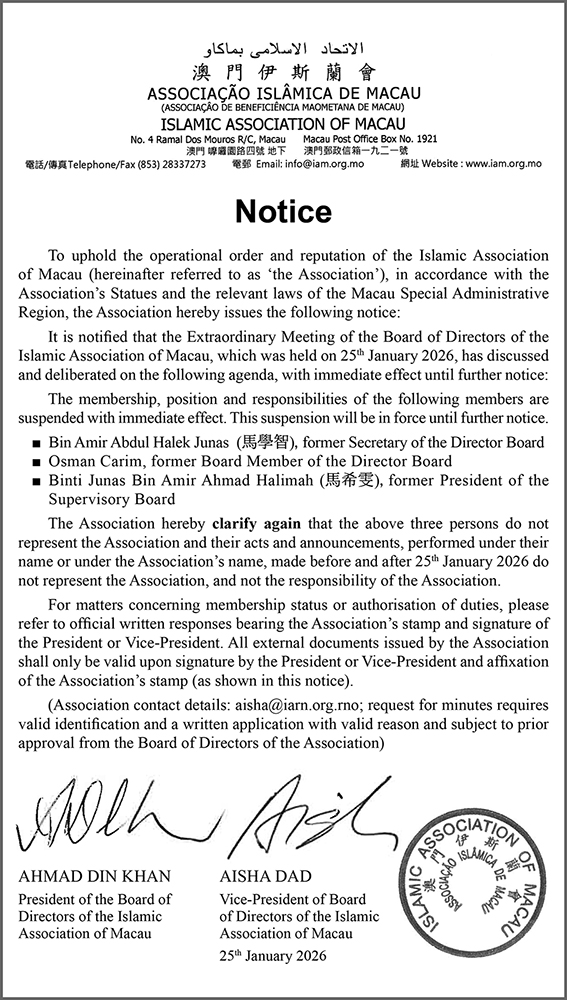The Legislative Assembly (AL) yesterday unanimously passed the outline of the government’s 2025 budget bill, the second one with a budget surplus after Macau’s post-pandemic economic recovery.
Introducing the outline of the 2025 budget bill during yesterday’s plenary session, Secretary for Economy and Finance Lei Wai Nong noted that next year would be the second time that the government was able to achieve a formally balanced budget without having to allocate money from its financial reserves, after Macau’s economic recovery from the adverse impact of the COVID-19 pandemic.
After yesterday’s passage of its outline, the 2025 budget bill will be passed to one of the legislature’s standing committees for an article-by-article review, after which it will be resubmitted to another plenary session for its second and final debate and article-by-article vote, which must be carried out before the end of next month.
The government’s 2025 budget must be promulgated in the Official Gazette (BO) by the end of this year for its implementation from the first day of next year.
The 2024 budget bill presented in 2023 expected the government to run a budget surplus again this year, after the government recorded a budget deficit for four consecutive years from 2020 to 2023. The COVID-19 pandemic affected Macau for three years from early 2020 through 2022, which severely impacted the city’s economy, which started its post-pandemic gradual recovery early last year.
This year’s budget surplus was expected to amount to 1.17 billion patacas.
Different to the three years of 2020, 2021 and 2022 when the government recorded a large budget deficit every year, its budget deficit in 2023 was relatively small as Macau’s gross gaming revenue (GGR), the government’s main source of its taxation income, began to steadily recover early last year.
Lei noted during yesterday’s plenary session that government revenues have been gradually improving since early 2023 when the local economy started its post-COVID-19 gradual recovery. The policy secretary said that the government expects Macau’s economic recovery to continue in 2025 resulting in continuous improvements in government revenues next year.
Consequently, Lei said, the government now expects next year’s GGR to reach 240 billion patacas, which he pointed out is a sum that constitutes the main source of budgeted government revenues proposed by the 2025 budget bill.
Because of the expected GGR of 240 billion patacas next year, according to the 2025 budget bill, the government’s 2025 direct gaming tax revenue is expected to amount to 84 billion patacas, i.e., 35 percent of the GGR.
Macau’s gaming operators pay 35 percent of their gross gaming receipts as direct tax to the government, apart from another five percent as levies for a wide range of public causes.
Lei said that according to its 2025 budget bill, the government expects its revenues to reach 121.09 billion patacas next year, while its expenditure next year is expected to amount to 113.38 billion patacas.
Consequently, according to the bill, the government expects to enjoy a budget surplus of 7.7 billion patacas next year.
The current administration headed by Chief Executive Ho Iat Seng will be succeeded by a new administration headed by Sam Hou Fai on December 20, 2024. The outgoing government proposes the 2025 budget bill to ensure the source for the next government’s expenditure for maintaining its normal operations.
The 2024 budget bill presented in 2023 expected this year’s GGR to reach 216 billion patacas. According to official data, Macau’s GGR amounted to 190.1 billion patacas during the first 10 months of this year.
Why GGR of 240 billion patacas in 2025?
During yesterday’s plenary session, several lawmakers asked Lei about the government’s reason for forecasting GGR of 240 billion patacas for next year.
Lei noted that during the 10 months of this year, Macau recorded GGR of 190.1 billion in total, equivalent to an average of 19 billion patacas per month. Lei noted that in 2023, the government expected 2024’s GGR to reach 216 billion patacas, equivalent to an average of 18 billion patacas per month.
Lei pointed out that if Macau records a monthly GGR of 18 billion patacas this month and next month, this year’s GGR would amount to 226 billion patacas, while if Macau records a monthly GGR of 19 billion patacas this month and next month, this year’s GGR would amount to 228 billion patacas.
Consequently, Lei said, this year’s GGR could be expected to reach between 226 billion patacas and 228 billion patacas, around five percent more than the initial forecast of 216 billion patacas.
Therefore, Lei underlined, the government expects next year’s GGR to be able to reach 240 billion patacas, representing an increase of around five or six percent from an amount of between 226 billion patacas and 228 billion patacas expected for the whole of this year.
Lei underlined that the government’s forecast of an increase of around five or six percent is a cautious one.
The policy secretary also noted that the government expects this year’s number of visitor arrivals to amount to 33 million, while next year number is expected to grow by nine percent to 36 million
Lei noted that nowadays Macau’s GGR generated by mass-market gamblers accounts for 76 percent of the total while the one generated by VIP gamblers makes up 24 percent, a major change from previously when the ratio was 40 percent versus 60 percent.
Consequently, Lei said, an increase in the number of visitor arrivals can be expected to proportionately contribute to an increase of GGR.
Therefore, Lei said, the government’s forecast of an increase of around five or six percent for next year GGR is a cautious one.
Back in pre-pandemic 2019, Macau recorded 39.4 million visitor arrivals.

Secretary for Economy and Finance Lei Wai Nong addresses yesterday’s plenary session in the Legislative Assembly’s (AL) hemicycle. – Photo courtesy of TDM









